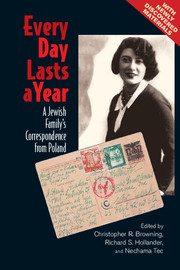Book contents
- Frontmatter
- Contents
- Introduction and Acknowledgments
- People Frequently Mentioned in the Correspondence
- EVERY DAY LASTS A YEAR
- PART ONE JOSEPH'S STORY
- PART TWO CRACOW
- PART THREE THE LETTERS
- 1 Letters without Reply: November 1939–May 1940
- 2 Separation Anxiety: May–August 1940
- 3 Exit Strategy: September–December 1940
- 4 Familial Love, Penned: January–December 1941
- Index
- Plate section
4 - Familial Love, Penned: January–December 1941
Published online by Cambridge University Press: 12 October 2009
- Frontmatter
- Contents
- Introduction and Acknowledgments
- People Frequently Mentioned in the Correspondence
- EVERY DAY LASTS A YEAR
- PART ONE JOSEPH'S STORY
- PART TWO CRACOW
- PART THREE THE LETTERS
- 1 Letters without Reply: November 1939–May 1940
- 2 Separation Anxiety: May–August 1940
- 3 Exit Strategy: September–December 1940
- 4 Familial Love, Penned: January–December 1941
- Index
- Plate section
Summary
In early 1941, rumors began percolating in Cracow about the creation of a ghetto for the Jews. Most Jews believed it would be established in the predominantly Jewish neighborhood of Kazimierz. Instead, on March 3, 1941, the Nazis announced that the ghetto would be created in Podgórze, a secluded working-class neighborhood situated on the right bank of the Vistula River. “Podgórze was a barren area,” remembers memoirist Janina Fischler-Martinho. “There were no trees, no greenery, no strip of grass to alleviate its harshness and squalor.” In all likelihood, the Nazis chose Podgórze as the ghetto site for more than its unsightly appearance and dilapidated buildings; the neighborhood was located near the Cracow-Plaszów railroad line – a necessary feature for deportations.
While the Germans were erecting the ghetto, Dola informed Joseph that she would soon marry a man named Munio Blaustein. Although Dola and Munio's hasty marriage created turmoil in the family, there was little choice for the newlywed couple; only 17,000 Jews in the Cracow district were allowed to move into the ghetto and Munio had not been included in that group. Whereas Dola had been unwilling to leave Cracow for Henek, she unhesitatingly moved with her new husband to the nearby town of Tarnów. She explained that “Munio had to leave and I ran after him before a Chinese Wall would have separated us forever.” The rest of the family bid Dola and Munio farewell and prepared to move into the ghetto.
- Type
- Chapter
- Information
- Every Day Lasts a YearA Jewish Family's Correspondence from Poland, pp. 209 - 280Publisher: Cambridge University PressPrint publication year: 2007



